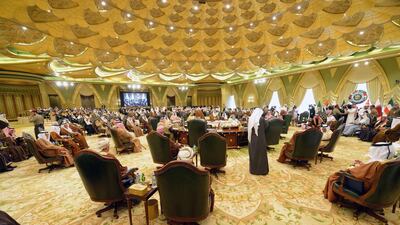“The Gulf Cooperation Council is looking at a rebirth ... provided there’s no foul play,” observed columnist George Semaan in the pan-Arab daily Al Hayat.
The Riyadh Summit last week paves the way for this second or third rebirth imposed, once again, by pressing regional circumstances.
The GCC was originally established in reaction to the regime change in Iran under Al Khomeini and the war between Iraq and the Islamic Republic, he wrote.
Before that, it was the Soviet Union’s invasion of Afghanistan – which had them inching closer to the warm waters of Pakistan.
With the fall of the Shah in Tehran, the six GCC member countries felt directly menaced, a situation that was compounded by the Iraqi Baath party’s maniacal undertakings that culminated with the invasion of Kuwait.
Gulf states took advantage of their neighbours’ preoccupation with war to proclaim an organisation that marks their political, military and economic unity when facing the impending threats coming from Tehran and Baghdad.
“Today’s circumstances aren’t any less menacing than they were back in the 1980s,” he added.
“Therefore, a regeneration of the Gulf Cooperation Council seems inevitable, especially in light of the reshaping taking place over the Middle East.
“The region as a whole is living at the pace of storms, not least of which is the one to be expected from the nuclear talks between Iran and the G5+1.
“The anticipated fallout doesn’t afford the region the luxury of procrastination regardless of the negotiations’ outcomes.”
A revival of the regional bloc – with additional emphasis on its unity, coupled with an expansion of its membership or partnerships, as ordained by present circumstances and challenges – is of the essence, the writer noted.
King Abdullah’s statement wasn’t a sudden awakening. It is the outcome of measures that have been gradually simmering for the past four years.
When the winds of change blew through the Arab world four years ago, Saudi along with the rest of the GCC states realised that they had been compromised, especially with Iraq falling under Iranian control and Syria’s drift towards the Iranian axis of power.
A review of the GCC was in order and it led to a number of measures and decisions in the form of economic and social changes within some member states and in the form of aid to Oman and Bahrain.
The organisation went on to extend invitations of membership to Jordan and Morocco, to become effective partners and to provide support in light of the absence and quasi failure of the Arab League.
“There’s no room any more for outdated strategies in this radically changing East,” he wrote.
“The GCC needs to play a different role and have a different outlook to the various elements of the Arab system, to bank on its strengths.”
Highlighting the same topic, the columnist Ayesha Al Marri, writing in Abu Dhabi’s daily Al Ittihad, the Arabic-language sister newspaper to The National, observed that the Gulf states, after more than three years of political polarisation, finally realised the need to put an end to their differences so they could avoid costly repercussions on their own security and on the Arab system.
Exacerbating inter-GCC differences amid the present political circumstances in the region would make the GCC part of the issue, knowing that it is the only Arab organisation that managed to maintain its cohesion despite the surrounding turmoil, she wrote.
Despite the escalating conflicts, GCC countries continue to express a sincere desire to contain disagreements amongst Gulf countries.
They have demonstrated political wisdom in addressing the root causes of conflicts.
Regaining the GCC’s strong political cohesion and harmony amongst its members will be a difficult and time-consuming matter.
Nonetheless, the Riyadh reconciliation accord signals the end of an era of inter-Gulf differences and a turbulent relationship between Qatar and Egypt.
Translated by Racha Makarem
RMakarem@thenational.ae

